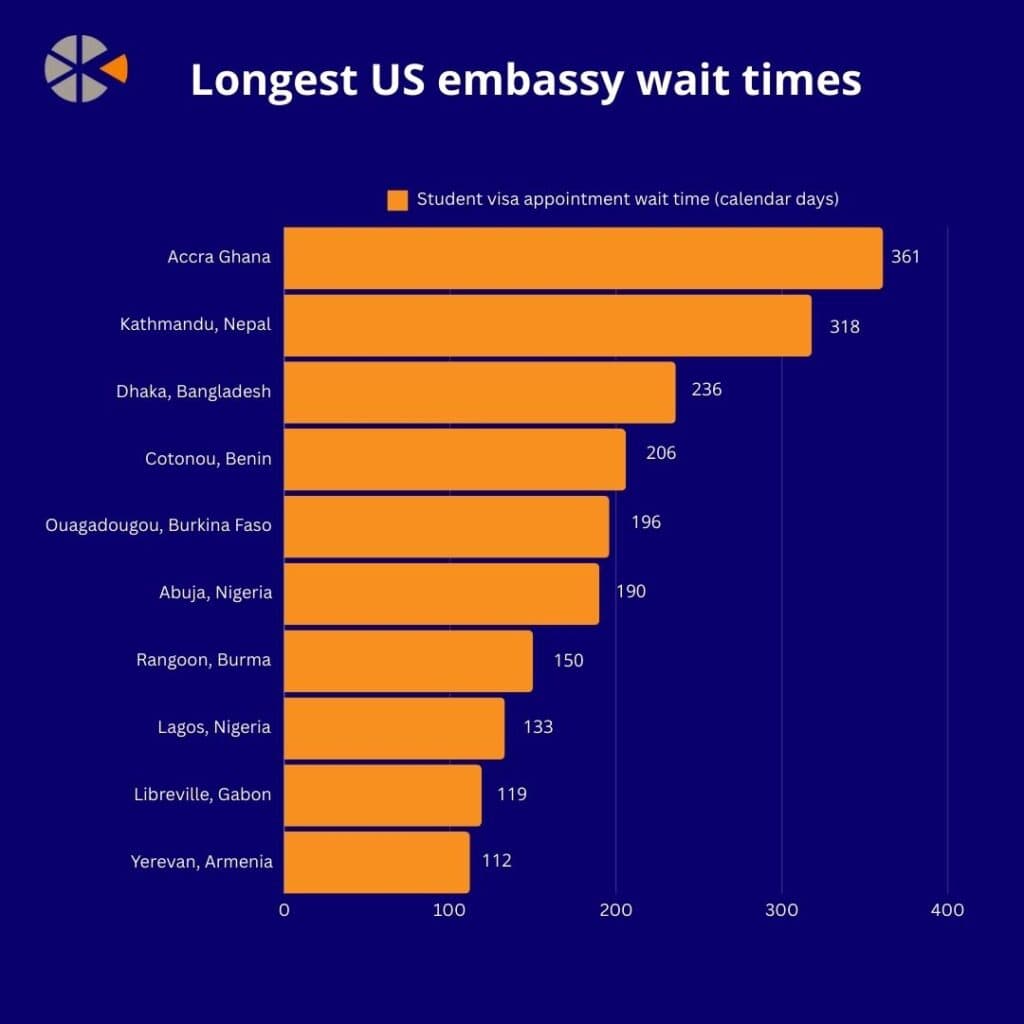The data, updated by the US government in July 2024, showed the longest visa appointment wait times of 361 days for students from Accra, Ghana, while many Indian embassies have cut down wait times to less than four weeks.
“The bottlenecks in South Asia are remarkable, the challenges in Africa must be addressed soon as demand is only going to increase, and in SE Asia there seems to be more progress in Vietnam and Thailand to keep up somewhat with growing demand,” international admissions expert Marty Bennett told The PIE News.
Embassies in Kolkata and Mumbai have seen significant improvements in visa wait times, which are down to 25 days as compared to 129 and 143 respectively in August 2022.
Estimated wait times at the US embassy in New Delhi, which were an estimated 245 days this time two years ago, are now an average of 23 days.
“There have been some interesting success stories, such as in India where a particularly motivated ambassador has made significant PR and actual practical advances in attempting to meet the gargantuan demand for a US higher education,” said Bennett.
The practical advancements include a new consulate building in Hyderabad and plans for three more in the coming years, a change to the visa appointment system that prevents “dodgy” agents from booking hundreds of appointments and selling them to “desperate” students, Bennett explained.
Source: US Department of State
While the data provides valuable insights into the global disparities, appointment wait times can vary weekly based on the availability of funding for additional consular officers, prioritisation by the ambassador and particular local strategies.
Long wait times are generally caused when high growth countries are under resourced and unable to keep up with high demand for appointments, this is felt particularly acutely in destinations with increased visa denials.
“Staffing post-pandemic continues to be the largest single prohibiting factor from meeting the expanded demand for US embassies and consulates abroad,” said Bennett.
When evaluating student visa applications, consular officers must examine visa overstay rates and economic growth rates for different countries, founder of Intead Ben Waxman told The PIE.
According to Waxman, 2022 US Homeland Security data revealed visa overstay rates with Ghana at 18% and Nigeria at 20% in comparison to the Bahamas and Jamaica at 1% to 5%. India’s overstay rate was 3%.
Despite delays in implementation, Bennett and Waxman agreed that the state is generally responsive to the changes in demand around the world, with Bennett pointing out the importance of interview waivers and expedited interviews in easing the visa application process.
“Automatically waiving in-person interviews for those with a valid visa within the last five years is big, but to give consular officers the ability to waive interviews in particular cases, and expedited visa interviews available for students running up against program start dates – and publicising that this is a possibility is a huge step forward”, said Waxman.
However, he noted that these measures are still dependent on staffing to accommodate emergency appointments and the discretion powers of consular officers to waive interviews.
Staffing post-pandemic continues to be the largest single prohibiting factor from meeting the expanded demand for US embassies
Marty Bennett, SMIE Consulting
Long wait times in high growth countries have an obvious impact on prospective students who, unable to get appointments before the start of the academic year, are forced to either defer and wait again or choose another destination country.
“This prevents US colleges from growing their overall international populations as quickly as they may like,” said Bennett, who added that the US requirement for in-person interviews for first-time US visa applicants puts it at a “competitive disadvantage” among other study destinations.
Recently, the Biden-Harris administration announced actions to speed up visa processing for college graduates who hold job offers, as well as updating the list of STEM subjects hat allow international students to qualify for a two-year extension of the one-year OPT work program.
The post Vast disparities in visa wait times revealed across US embassies appeared first on The PIE News.


